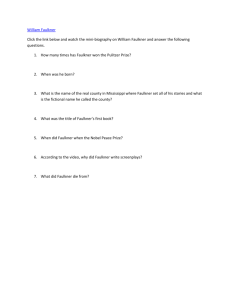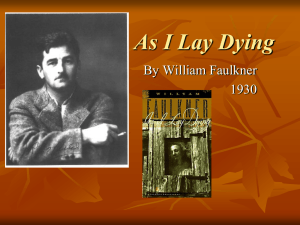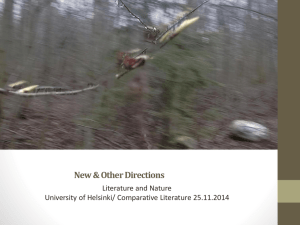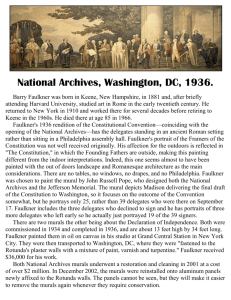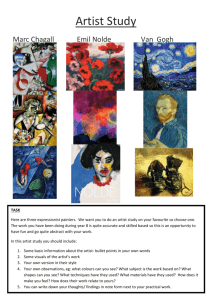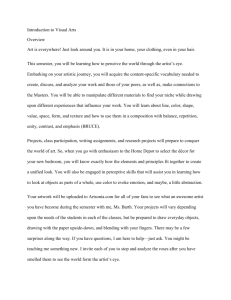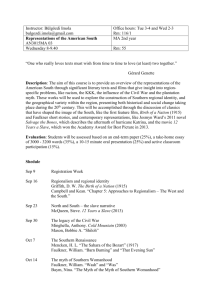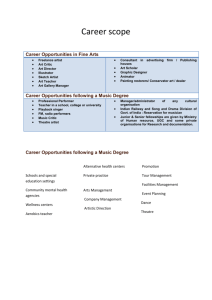William Moss - William Faulkner Society
advertisement
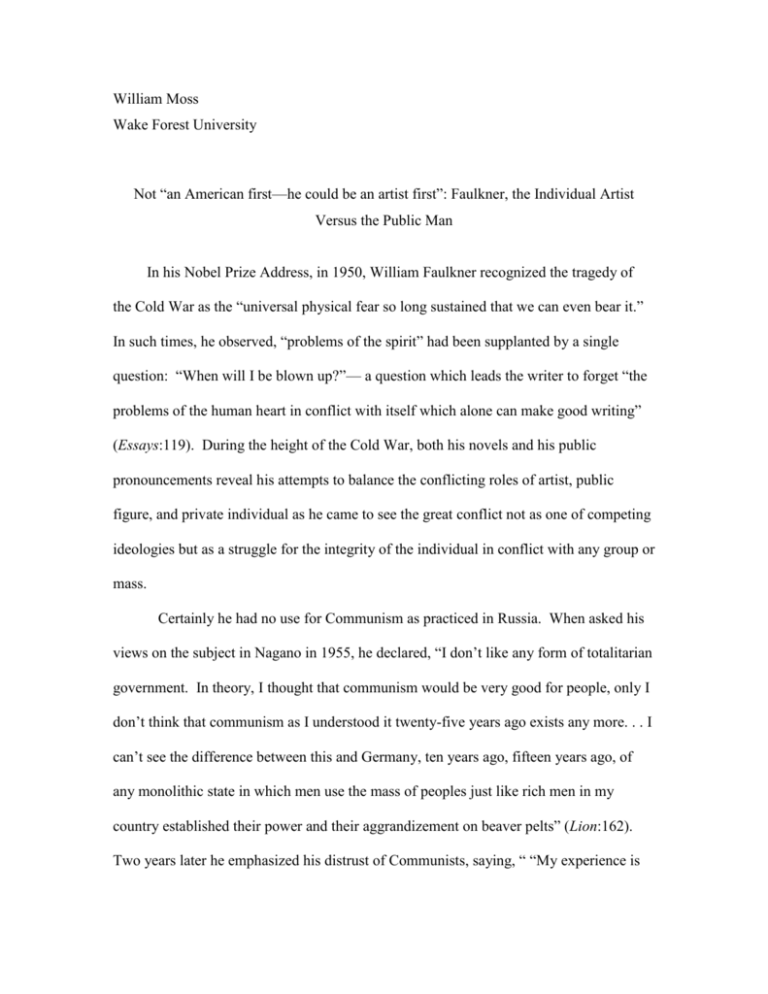
William Moss Wake Forest University Not “an American first—he could be an artist first”: Faulkner, the Individual Artist Versus the Public Man In his Nobel Prize Address, in 1950, William Faulkner recognized the tragedy of the Cold War as the “universal physical fear so long sustained that we can even bear it.” In such times, he observed, “problems of the spirit” had been supplanted by a single question: “When will I be blown up?”— a question which leads the writer to forget “the problems of the human heart in conflict with itself which alone can make good writing” (Essays:119). During the height of the Cold War, both his novels and his public pronouncements reveal his attempts to balance the conflicting roles of artist, public figure, and private individual as he came to see the great conflict not as one of competing ideologies but as a struggle for the integrity of the individual in conflict with any group or mass. Certainly he had no use for Communism as practiced in Russia. When asked his views on the subject in Nagano in 1955, he declared, “I don’t like any form of totalitarian government. In theory, I thought that communism would be very good for people, only I don’t think that communism as I understood it twenty-five years ago exists any more. . . I can’t see the difference between this and Germany, ten years ago, fifteen years ago, of any monolithic state in which men use the mass of peoples just like rich men in my country established their power and their aggrandizement on beaver pelts” (Lion:162). Two years later he emphasized his distrust of Communists, saying, “ “My experience is Moss (2 of 14) that it is impossible to speak to a Communist man to man. . . . I doubt if there is any way that one can touch him with human spirit to human spirit. I know I can’t” (University:166-167). He did agree, in the spring of 1955, to do his part for the country, traveling to Europe and to Japan to represent the United States for the State Department, to try to show to those people “a side of our country you don’t know.” But even as he contemplated the mission, he considered the role of the artist in America as “a little like the old court jester. He’s supposed to speak his vicious paradoxes with some sense in them, but he isn’t part of whatever the fabric is that makes a nation” (Lion:82). He drew the line, however, at visiting Russia. When asked to do so by the State Department in 1958, he replied, I believe that for me to decline this invitation to visit Russia as a guest of the present Russian government would be of more value in the ‘cold war’ of human relationships than my presence in Russia would. The Russia with which I have, I hope, earned any right to spiritual kinship was the Russia which produced Dostoievsky, Tolstoy, Checkov, Gogol, etc. That Russia is no longer there. . . . If by going to Russia under any conditions . . . I could free one Anna Karenina or Cherry Orchard, I would do so. But to go there now, as a guest of the present Russian government which, as I believe, has driven underground and would destroy them if it could, the heirs of the old giants of the Russian spirit, would be not only a lie but a betrayal. . . (Letters:413) Moss (3 of 14) Even here, Faulkner’s position had nothing to do with nationality or ethnicity. In a world divided into armed camps, he continued consistently to deny such markers of difference. “I don’t think that people are that different,” he said. “I think there is not a great deal of difference between Southerners and Northerners, and American and Russians and Chinese. . . . their behavior might be a little awry from what it is in North Mississippi, but . . . they—Russians or Chinese—would still want to be better than they are afraid they might be, and they would try to be better” (University, 87). Even in refusing to travel to Russia, he had expressed his admiration for the Russian people, suggesting, “all that saves the rest of us is Communism. If the Russians were free, they would probably conquer the earth” (Letters: 413). In the end he came to deny the importance of “national characteristics,” to consider them “dangerous if you pay too much attention to them” (West Point:101). Again and again, he stressed the importance of the individual as opposed to any group, national or political. “[I]f I ever become a preacher,” he said, “it will be to preach against man, individual man, relinquishing into groups, any group. I’m against belonging to anything. . . . except the human race” (University:269). And preach, on this topic, he did, declaring, at Nagano, his own belief that “the salvation of man is in his individuality.” Again at Nagano, he held, “It’s that single voice that’s the important thing. When you get two people, you still got two human beings when you get three you get the beginning of a mob. And if you get a hundred all focused on one single idea, that idea is never too good” (Lion:192,102-103). It was “that belief in individual liberty and equality and freedom” that he saw as “the one idea powerful enough to stalemate the idea of communism.” “But then,” he Moss (4 of 14) announced in 1955, “we don’t need anything more since that simple belief of man that he can be free is the strongest force on earth” (Essays:101-102,146-147). For Faulkner, the conflict was not between two irreconcilable ideologies but between monolithic government and the natural desire of men to be free (Lion:199-200; Essays:102). Asked in 1955 for points for combating Communism, he replied, “Well, I think the first one would be to believe in ‘me,’ in ‘I,’ rather than ‘we,’ to be oneself, to resist the pressure to relinquish individuality. That’s the first thing and maybe that’s all anyone has to do to combat Communism. That is I think that it can be combated, must be combated, and conquered, if it is to be conquered, not by people forming mass meetings in groups but by individuals.” He insisted, “That the individual is more important than any mass or group he belongs to. . . . That the state must never be master of the individual, it is the servant of the individual” (University:100). The threat of the state, of any system, to the individual, in his mind was by no means limited to Communism. In fact, only a year after his Nobel speech, he declared that the great fear that threatened the world was not fear of the bomb: Our danger is not that. Our danger is the forces of the world today which are trying to use man’s fear to rob him of his individuality, his soul . . . the economies or ideologies or political systems, communist or socialist or democratic, whatever they wish to call themselves, the tyrants and the politicians, American or European or Asiatic, whatever they call themselves, who would reduce man to one obedient mass for their own aggrandizement and power, or because they themselves are baffled and afraid . . . (Essays:123) Moss (5 of 14) The forces that threatened the “free world” could operate under the banner of nationalism or patriotism as well as Communism, in America as well as in Russia. As the group commander explains to the division commander whose troops’ refusal to attack had temporarily halted the war in A Fable, the whole machinery and establishment of war could be brought down by “The simple effacement from man’s memory of a single word . . . . Fatherland” (54). In the year before publication of that novel, Faulkner admonished in his own words, “[W]e must break ourselves of thinking in the terms foisted on us by the split-offs of that old dark spirit’s ambition and ruthlessness: the empty clanging terms of ‘nation’ and ‘fatherland’ or ‘race’ or ‘color’ or creed’” (Essays:141-142). When asked, at West Point, about the possibility that the world situation might “infuse a new spirit of nationalism into American literature,” he replied, “If a spirit of nationalism gets into literature, it stops being literature” (West Point:52-53). He saw the repression of the individual under such banners or slogans as a largely accomplished condition in the Cold-War United States amid the “babbling” of “the mouthsounds; the loud and empty words which we have emasculated of all meaning whatever—freedom, democracy, patriotism.” In Harper’s, in 1955, he railed, “The point is that in America today any organization or group, simply by functioning under a phrase like Freedom of the Press or National Security or League against subversion, can postulate to itself complete immunity to violate the individualness . . . of anyone who is not himself a member of some organization or group numerous enough or rich enough to fend them off.” Such words as “‘Security’. ‘Subversion’. ‘Anti-Communism’. ‘Prosperity’. ‘The American Way’. ‘The Flag’,” he complained, had been “emasculated of any significance or meaning other than as tools, implements, for the further harassment Moss (6 of 14) of the private individual human spirit.” One might defend oneself against other individuals. “But,” he warned, “when powerful federations and organizations and amalgamations like publishing corporations and religious sects and political parties and legislative committees can absolve even one of their working units of the restrictions of moral responsibility by means of such catch-phrases as ‘Freedom’ and ‘Salvation’ and ‘Security’ and ‘Democracy’ . . . then let us beware.” (Essays:62,70,73). In the mid 1950s, he found ample targets for protest, from the expulsion from the U.S. of the Metropolitan of the Russian Orthodox Church to the arrest of a woman for bringing a bottle of whisky into Grenada County Mississippi on information of the “naturally, nameless—patriot who reported her” (Letters:379,402). In Washington, William Jenner’s Senate Internal Security Subcommittee hearings on Communist influence in education and Harold R. Velde’s House Un-American Activities Committee hearings on Communist influence in the entertainment industry complemented Joseph McCarthy’s Senate Permanent Investigating Subcommittee hearings (both public and secret) into Communist influence in government and American life. For McCarthy Faulkner expressed both hatred and shame (Letters:363; Lion:78), later saying that he had served the purpose of strengthening the belief among people “that never thought about it before” “that the freedom of thought must be inviolable,” though that purpose had to “be paid for with the three or four years of McCarthy” (University: 169). In The Mansion (1959), Gavin Stevens and V. K. Ratliff lump Hitler, Mussolini, Franco, Stalin, and “the ones right here at home: the organizations with the fine names confederated in unison in the name of God against the impure in morals and politics and with the wrong skin color and ethnology and religion” (along with Yoknapatawpha County’s own Senator Moss (7 of 14) Clarence Egglestone Snopes) among “the parasites–the hereditary proprietors, the farmers-general of the human dilemma . . . . the same old cynical manipulators” (160161). That 1959 novel, in fact, although set for the most part before the end of World War II, is perhaps Faulkner’s closest depiction of Cold War conditions in the United States. Although he steadfastly abjured the role of polemicist or propagandist (e.g., Lion:200,201; University:177; West Point:50-51,57), he had dealt with the impact of war on the returning veteran in his first novel, Soldier’s Pay. in 1926, and to a lesser extent in Flags in the Dust, in 1929. He dealt with the war establishment to some extent in the short story “Turnabout” and turned in A Fable (1954) to a moral allegory of the conflicting demands of God and country, of nationalism and private conscience. In parts of The Mansion, the culmination of the Snopes Trilogy, he presents perhaps a fable of a more subtle sort. Here V. K. Ratliff, who had appeared in Flags in the Dust as V. K. Suratt, itinerant sewing machine salesman, wry commentator and conscience of the community, whom Faulkner repeatedly cited as his favorite among his own characters (e.g., Letters:142; University:253; Lion:224; West Point:115), owns up to his name Vladimir Kyrilytch and his descent from a Russian mercenary in the British Army during the American Revolution. In New York the Russian émigré Myra Allanovna (167) custom makes for him one of her exclusive Allanovna ties and kisses him. What brings Ratliff to New York, dragged along by Gavin Stevens, is the wedding of the altogether sympathetic Linda Snopes to the Jewish Communist sculptor Barton Kohl. Linda too joins the Party, and the two of them go to fight with the Loyalists in Moss (8 of 14) Spain, where he is killed and she loses her hearing in an explosion. At a time when a record of participation in the Spanish Loyalist cause was enough to bring one to the attention of the watchdog committees of anti-Communism, Ratliff says of these two, “When you are young enough and brave enough at the same time, you can hate intolerance and believe in hope and, if you are sho enough brave, act on it. . . . I wish it was me. . . . I wish I was either one of them. To believe in intolerance and hope and act on it. At any price” (161). Stevens’ nephew Charles Mallison observes that those who had survived the fight for that cause “in no time now would begin to be proscribed and investigated by the F.B.I., not to mention harried and harassed by the amateurs, but we hadn’t quite reached that yet” (217). Linda, back in Jefferson, ineffectually busy with her social causes among the black people of Jefferson and enduring the sidewalk scrawls of Kohl Communist Jew (perhaps the work of her father Flem), of course is investigated by the F.B.I. Gavin Stevens is visited by an agent, “a quiet, neat, almost negative man of no particular age between twenty-five and fifty, as they all appear,” who wants her to reveal the names of her Communist and fellow-traveler associates in New York. “I see,” says Stevens, “You offer a swap. You will trade her immunity for names. Your bureau will whitewash her from an enemy into a simple stool pigeon” (228,240,233, 236). Divining that Flem has stolen his daughter’s Communist Party card, Stevens contemplates turning to “that vast Omnipotence called Government,” considering writing a penny post card as a “Patriotic Citizen” to J. Edgar Hoover: Moss (9 of 14) Herbert Hoover F B & I Depment Jackson Miss If you will come up to Jefferson Miss and serch warant the bank and home of Flem Snopes you will fined a commonist party card Patriotic Citizen He realizes, however, that Linda would affirm the card as her own, “would probably have gone to [the F.B.I. agent] or any else available before this and declared her convictions if it had occurred to her that they might be interested. Whereupon, from then until even the stronger alliance of cosmic madmen had finally exhausted themselves into peace and oblivion, she would be harried and harassed and spied upon day and night, waking and eating and sleeping too” (243-244). Faulkner manages to poke fun at both the Communists and the anti-Communists, recounting the story of the only other Communists in Jefferson, two Finns who had taken “it for granted that there was a proletariat in Jefferson . . . and as soon as they learned English they would find it and, all being proletarians together, they would all be communists together too as was not only their right and duty but couldn’t help themselves.” One, the “slow learner,” couldn’t fathom “a condition in which the Jefferson proletariat declined not only to know it was the proletariat but even to be content as the middle class, being convinced instead that it was merely in a temporary interim state toward owning in its turn Mr Snopes’ bank or Wallstreet Snopes’s wholesale grocery chain or (who knows?) on the way to the governor’s mansion in Jackson or even the White House in Washington.” The other had learned some time ago that any proletariat he became a member of in Jefferson, he would have to manufacture first. . . . and the only material he had Moss (10 of 14) were Negroes. Because among us white male Jeffersons there was one concert of unanimity, no less strong and even louder at the bottom . . . against everybody they called communists now—Harry Hopkins, Hugh Johnson, Eugene Debs, the I.W.W, the C.I.O.—any and everybody who seemed even to question our nativeborn Jefferson right to buy or raise or dig or find anything as cheaply as cajolery or trickery or threat or force could do it, and then sell it as dear as the necessity of ignorance or timidity of the buyer would stand. (213-214) In the tragi-comic end, however, the culmination of the trilogy fable of the rise of the dispossessed to possessor and of his ultimate fall, banker Flem Snopes, the quintessential capitalist entrepreneur and manipulator, is finally destroyed, assassinated by his fiercely individualist proletarian cousin Mink, silently abetted by his daughter Linda, the avowed and unrepentant Communist, who drives away in her new Jaguar, purchased with Flem’s questionably gotten gains, leaving the mansion of the title not to those subalterns for whose betterment she had labored but to the heirs of the aristocratic de Spains, whom Flem had himself dispossessed. Just what is the moral of this fable, I leave to later consideration. By the time of that novel, Faulkner had learned through personal experience the workings of the Cold War establishment, having himself undertaken an uncharacteristic role as Cold Warrior. In 1956 President Eisenhower had requested leading figures in various professions to join a “people-to people” program to help to heal the ruptures between the U.S. and other nations exacerbated by the Cold War and had called on Faulkner to lead the writers’ group. Although he had seen Eisenhower’s defeat of Stevenson as a symptom of the ills of the nation, he accepted the call. Ever suspicious of Moss (11 of 14) groups of any kind, he doubted that “people accomplish much by banding together.” (University:80). But this effort seemed in line with his idea, expressed at Nagano a year earlier, that “what we need if we are to make this world any better for all of us is for people not to make speeches, lecture to one another, but to talk to one another,” “to communicate, human being to human being” ((Lion:166,188). He attended a meeting with Eisenhower, Secretary of State John Foster Dulles, and Vice President Richard Nixon and went to work under secretary of Defense Charles E. Wilson, general chairman of the People-to-People Program and former president of General Motors, who was credited, in something of a distortion, with saying, "What's good for General Motors is good for the country." In a mimeographed letter to many writers, Faulkner solicited opinions as to what the writers might do to convey “a true picture of our country to other people,” adding his own humorous suggestions, including: 1. Anesthetize, for one year, American vocal chords. 2. Abolish, for one year, American passports. 3. Commandeer every American automobile. Secrete Johnson grass seed in the cushions and every other available place. Fill the tanks with gasoline. Leave the switch key in the switch and push the car across the iron curtain. (Letters:403-404) Still, he did his patriotic best, enlisting the help of friend Harvey Breit of the New York Times Book Review as co-chair, as well as Donald Klopfer, Saxe Commins, and Jean Ennis of Random House (SL:403-404,406,407-408). After collation of the responses and a meeting in New York with the writers’ group, he told Commins that he would send the Moss (12 of 14) report (drafted by Commins) to Eisenhower, commenting, “Then I don’t know what more we can do. Though as loyal citizens and cognizant by our craft of world conditions, he already knows he has only to call on us further” (SL:406). By the spring of 1958, however, he would denounce the program as symptomatic of “an evil inherent in our culture itself.” The idea, he allowed, was “basically a sound one. This was that world conditions, the universal dilemma of mankind at this moment, are what they are simply because individual men and women of different races and tongues and conditions cannot discuss with one another these problems and dilemmas which are primarily theirs, but must attempt to do so only through the formal organizations of their antagonistic and seemingly irreconcilable governments.” “Certainly,” he said, “no artist . . . would dispute it because this—trying to communicate man to man regardless of race or color or condition—is exactly what every artist has already spent all his life trying to do, and as long as he breathes will continue to do.” The program’s doom, in his mind, “was sympotomised by the phraseology of the President’s own concept: laborer to laborer, artist to artist, banker to banker, tycoon to tycoon. . . the mystical belief, almost a religion, that individual man cannot speak to individual man because individual man can no longer exist. . . . and man himself can hope to continue only by relinquishing and denying his individuality into a regimented group of his arbitrary kind, arrayed against an opposite opposed arbitrary factional and regimented group.” The artist, Faulkner held, “has in effect been asked by the President of his country to affirm that mythology which he has already devoted his life to denying: the mythology that one single individual man is nothing, and can have weight and substance only where Moss (13 of 14) he will have surrendered his individual soul.” The artist’s “tragedy,” he protested, “is that today he must even combat this pressure, waste some part of his puny but (if he is an artist) precious individual strength against this universal will to efface his individual humanity, in order to be an artist” (Essays:160-162; also University:241-243) His brief, uncharacteristic enlistment in the ranks of Cold Warrior had apparently resolved the conflict between the roles of patriotic public figure and of individual artist, had reinforced the position that he had long held. For Faulkner, the artist’s only role in such times must be to “show the world that the artist in America did not have to be an American first—he could be an artist first” (University:155). Moss (14 of 14) Works Cited Blotner, Joseph. ed. Selected Letters of William Faulkner. New York: Random House, 1977. --- ed. Faulkner in the University. New York: Random House, 1965. Fant, Joseph L., III and Ashley, Robert, eds. Faulkner at West Point. New York: Random House, 1964. Faulkner, William. A Fable. New York: Random House, 1954. ---. The Mansion. New York: Random House, 1959. Meriwether, James B., ed. William Faulkner Essays, Speeches & Public Letters. New York: Random House, 2004. Meriwether, James B. and Millgate, Michael, eds. Lion in the Garden: Interviews with William Faulkner 1926-1962. Lincoln: University of Nebraska Press, 1980.
